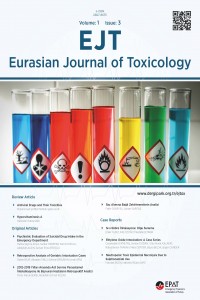Abstract
Yüksek mortalite ve morbidite oranlarına sahip toksik epidermal nekroliz (TEN) genellikle ilaç tedavisinden sonra gelişir. Klinik olarak, mukoza ve cildin en az% 30'u tutulur. Nötropeni TEN olgularında çok nadir görülür ve doğrudan mortalite ile ilişkilidir. Takip sırasında nötropeni gelişen ve erken tanı ve etkili tedavi ile tam iyileşme ile taburcu edilen TEN tanılı bir vakayı paylaşmak istedik.
References
- 1. Gleckman, R., N. Blagg, and D.W. Joubert. Trimethoprim: mechanisms of action, antimicrobial activity, bacterial resistance, pharmacokinetics, adverse reactions, and therapeutic indications. Pharmacotherapy, 1981. 1(1): p. 14-20.
- 2. Dodiuk-Gad, R.P., et al. Stevens-Johnson Syndrome and Toxic Epidermal Necrolysis: An Update. Am J Clin Dermatol, 2015. 16(6): p. 475-93.
- 3. Roujeau, J.C. The spectrum of Stevens-Johnson syndrome and toxic epidermal necrolysis: a clinical classification. J Invest Dermatol, 1994. 102(6): p. 28S-30S.
- 4. Duncan, K.O., R.E. Tigelaar, and J.L. Bolognia, Stevens-Johnson syndrome limited to multiple sites of radiation therapy in a patient receiving phenobarbital. J Am Acad Dermatol, 1999. 40(3): p. 493-6.
- 5. Roujeau, J.C. and R.S. Stern. Severe adverse cutaneous reactions to drugs. N Engl J Med, 1994. 331(19): p. 1272-85.
- 6. Mockenhaupt, M. Severe drug-induced skin reactions: clinical pattern, diagnostics and therapy. J Dtsch Dermatol Ges, 2009. 7(2): p. 142-60; quiz 161-2.
- 7. Shear, N.H., et al. Differences in metabolism of sulfonamides predisposing to idiosyncratic toxicity. Ann Intern Med, 1986. 105(2): p. 179-84.
- 8. Revuz, J., et al. Toxic epidermal necrolysis. Clinical findings and prognosis factors in 87 patients. Arch Dermatol, 1987. 123(9): p. 1160-5.
- 9. Gueudry, J., et al. Risk factors for the development of ocular complications of Stevens-Johnson syndrome and toxic epidermal necrolysis. Arch Dermatol, 2009. 145(2): p. 157-62.
- 10. Meneux, E., et al. Vulvovaginal involvement in toxic epidermal necrolysis: a retrospective study of 40 cases. Obstet Gynecol, 1998. 91(2): p. 283-7.
- 11. Fernando, S.L. The management of toxic epidermal necrolysis. Australas J Dermatol, 2012. 53(3): p. 165-71.
- 12. Kirchhof, M.G., et al. Retrospective review of Stevens-Johnson syndrome/toxic epidermal necrolysis treatment comparing intravenous immunoglobulin with cyclosporine. J Am Acad Dermatol, 2014. 71(5): p. 941-7.
- 13. Paradisi, A., et al. Etanercept therapy for toxic epidermal necrolysis. J Am Acad Dermatol, 2014. 71(2): p. 278-83.
Abstract
Toxic Epidermal Necrolysis (TEN), which has high
mortality and morbidity rates, often develops after medication. Clinically, at
least 30% of the mucous membranes and skin are involved. Neutropenia is very
rare in TEN cases and is directly related to mortality. We wanted to share a case
diagnosed with TEN, caused by trimethoprim/sulfamethoxazole, who developed
neutropenia during follow-up and was discharged with full recovery with early
diagnosis and effective treatment.
References
- 1. Gleckman, R., N. Blagg, and D.W. Joubert. Trimethoprim: mechanisms of action, antimicrobial activity, bacterial resistance, pharmacokinetics, adverse reactions, and therapeutic indications. Pharmacotherapy, 1981. 1(1): p. 14-20.
- 2. Dodiuk-Gad, R.P., et al. Stevens-Johnson Syndrome and Toxic Epidermal Necrolysis: An Update. Am J Clin Dermatol, 2015. 16(6): p. 475-93.
- 3. Roujeau, J.C. The spectrum of Stevens-Johnson syndrome and toxic epidermal necrolysis: a clinical classification. J Invest Dermatol, 1994. 102(6): p. 28S-30S.
- 4. Duncan, K.O., R.E. Tigelaar, and J.L. Bolognia, Stevens-Johnson syndrome limited to multiple sites of radiation therapy in a patient receiving phenobarbital. J Am Acad Dermatol, 1999. 40(3): p. 493-6.
- 5. Roujeau, J.C. and R.S. Stern. Severe adverse cutaneous reactions to drugs. N Engl J Med, 1994. 331(19): p. 1272-85.
- 6. Mockenhaupt, M. Severe drug-induced skin reactions: clinical pattern, diagnostics and therapy. J Dtsch Dermatol Ges, 2009. 7(2): p. 142-60; quiz 161-2.
- 7. Shear, N.H., et al. Differences in metabolism of sulfonamides predisposing to idiosyncratic toxicity. Ann Intern Med, 1986. 105(2): p. 179-84.
- 8. Revuz, J., et al. Toxic epidermal necrolysis. Clinical findings and prognosis factors in 87 patients. Arch Dermatol, 1987. 123(9): p. 1160-5.
- 9. Gueudry, J., et al. Risk factors for the development of ocular complications of Stevens-Johnson syndrome and toxic epidermal necrolysis. Arch Dermatol, 2009. 145(2): p. 157-62.
- 10. Meneux, E., et al. Vulvovaginal involvement in toxic epidermal necrolysis: a retrospective study of 40 cases. Obstet Gynecol, 1998. 91(2): p. 283-7.
- 11. Fernando, S.L. The management of toxic epidermal necrolysis. Australas J Dermatol, 2012. 53(3): p. 165-71.
- 12. Kirchhof, M.G., et al. Retrospective review of Stevens-Johnson syndrome/toxic epidermal necrolysis treatment comparing intravenous immunoglobulin with cyclosporine. J Am Acad Dermatol, 2014. 71(5): p. 941-7.
- 13. Paradisi, A., et al. Etanercept therapy for toxic epidermal necrolysis. J Am Acad Dermatol, 2014. 71(2): p. 278-83.
Details
| Primary Language | English |
|---|---|
| Subjects | Emergency Medicine |
| Journal Section | Case Reports |
| Authors | |
| Publication Date | November 28, 2019 |
| Submission Date | November 4, 2019 |
| Published in Issue | Year 2019 Volume: 1 Issue: 3 |


